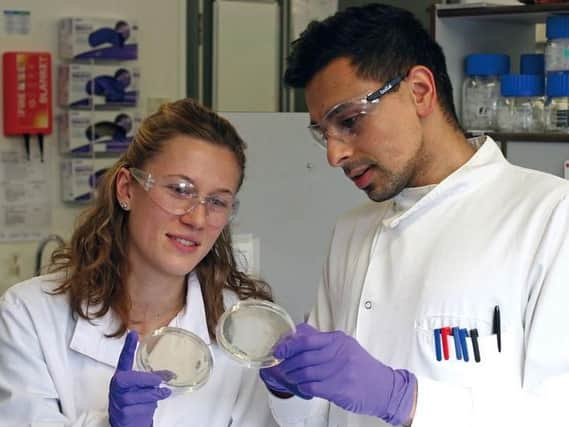'Dating agency' helps visionary Scottish biotech firms woo brightest brains


If there’s any question over just how far Scotland has come in developing its industrial biotechnology sector, then Roger Kilburn may have the answer. He tells of attending a recent European Forum for Industrial Biotechnology.
“I was presenting on investing in Scotland,” he recalls. “We were introduced by the chair, who said, ‘Five years ago we had never heard of Scotland in biotech. And now they seem to be everywhere’.”
Advertisement
Hide AdAdvertisement
Hide AdScotland’s status on the international stage is not going unnoticed. And as chief executive of the Industrial Biotechnology Innovation Centre (IBioIC), Kilburn has not just watched Scotland’s presence in the sector strengthen and grow, he and his colleagues have played a key role in making it happen.


Since its launch in 2014, IBioIC has helped Scotland position itself as a significant player in the bio-economy by forging links between academia, industry and government, raising the nation’s profile on the international stage and helping fledgling businesses push forward their ingenious biotech innovations.
At the same time, it is ensuring Scotland has the skilled workforce to meet the developing sector’s needs – today and tomorrow – with MSc and PhD funding helping to develop the next generation of bright minds.
There is a lot at stake. In 2013, Scottish Enterprise set a new target for the industrial biotech (IB) sector in a bid to capture a larger share of a global market worth, at the time, around £360 billion.
In those days, Scotland’s annual turnover related to IB stood at


£189 million. The new strategy set sights on a much bigger figure than that: £900m turnover by 2025.
To help create the right environment for growth, IBioIC was launched. A hub for the country’s IB projects, it glues together visionary companies with academic institutions, supports the sector with funding, project management, access to equipment and skilled workers regardless of the size of the business.
Back at the start, recalls Kilburn, around 40 firms were known to be operating. It was soon clear that they were only part of the story.
Advertisement
Hide AdAdvertisement
Hide Ad“What surprised me was the amount that was going on,” he says. “We identified 207 research teams working in Scotland. Some might have been a one-man band, or it might be eight or nine people, but it was a lot of people.
“While they were getting funding for research work, it wasn’t all ‘joined’ together.
“Joining it up has been the most enlightening part for me.”
That is the “age-old problem”, he adds. “The UK has fantastic academic assets, but they don’t convert to economic activity. Universities are good at invention, other people innovate.
“We were established to encourage academics to work on problems that industry wanted to solve.
“The twist is that we’re led by industry rather than academia. And that means the work that is getting done is work that industry wants done.”
At IBioIC’s core are its 100-plus industrial members who pay to tap into the innovation centre’s academic connections, its ability to source funding for research projects – to be matched by the industrial partner – and support in helping bring minds and skills together.
With links to Innovate UK, research councils working with enterprise agencies, the European Bio-based Industries Consortium – with its feed into the Horizon 2020 project and its €80bn fund – and the Vanguard Initiative which is dedicated to advancing industrial innovation in Europe, IBioIC has already opened the door to new IB business and helped others scale up.
Advertisement
Hide AdAdvertisement
Hide AdOne method is via IBioIC’s IB Accelerator Programme, a series of funding competitions designed to bridge the gap between those academic minds with industry innovators, which has funded 32 projects to a value of £8.1m. Total grants awarded have amounted to £3.8m.
Its “hackathons”, when industry arrives with a problem it needs solved and representatives from academia and other sectors bash heads together, can throw up unexpected partnerships at times.
“Industrial biotech is largely around using more sustainable feedstocks for manufacturing materials, pharmaceuticals, energy and fuel,” Kilburn explains.
“But the people that currently have those raw materials don’t necessarily see themselves as part of those industries.
“For example, GSK takes fructose and glucose to its factory in Irvine to produce antibiotics,” he says.
“GSK came to us looking for non-food grade sources of glucose. So we held a workshop where they met a bunch of people from different sources.
“They honed in on waste bread. It was symbiosis,” he adds. “Now instead of using a food grade product, they are using a waste product.”
It’s a win-win solution which not only aids GSK, but helps to tackle another area where Scotland has ambitious targets – food waste.
Advertisement
Hide AdAdvertisement
Hide AdThat’s just one of scores of examples. IBioIC has supported Celtic Renewables as it explores turning by-products of whisky production into biobutanol biofuel, and
CelluComp, which has found a way of extracting thickening agents from waste root vegetables.
“Put a tiny amount into a litre of water and it turns to a gel,” says Kilburn.
“Anything that needs thickening – washing-up liquids, shampoos, for example – from a carrot.”
IBioIC has supported Marine Biopolymers which specialises in the multi-component extraction of natural polymers from seaweed. Scotland’s rich marine environment is one area receiving intense attention from IB innovators.
“CellsUnited is extracting amino acids from fish waste, purifying it and putting it into high-performance, high-protein energy drinks for elite sportsmen,” adds Kilburn. “Fish waste is a problem, normally half your salmon is a waste.”
A key focus is to help develop the next generation of IB scientists with MSc and PhD funding, work placements for students – most of which result in employment – and upskilling today’s workforce to take advantage of the emerging sector.
So far almost 100 MSc students have graduated – nearly 30 have just started their course – and IBioIC is currently funding 45 PhD studentships, all with industry sponsors.
Advertisement
Hide AdAdvertisement
Hide AdAn industrial biotechnology HND course is also being trialled at Glasgow Clyde College for 15 students. At the same time IBioIC is raising Scotland’s profile on the international stage, highlighting Grangemouth as an attractive location with a willing landlord and skilled workforce, and emphasising the national welcoming “can do” approach.
So how hopeful is he of hitting that £900m annual turnover target? “We’re on track,” says Kilburn, who arrived at IBioIC after a role as managing director at McFarlan Smith, the Edinburgh pharmaceutical research company.
“I think we have an attractive package and I’m pleased at the way we have put Scotland on the map.”
INGENZA
Dr David McElroy has a concise way of describing IBioIC’s role in Scotland’s industrial biotechnology sector.
“It’s a kind of dating agency,” explains the chief business officer at Edinburgh-based Ingenza, a specialist in synthetic biology.
“It used to be based on happenstance,” he adds, referring to how in the days before IBioIC, businesses such as Ingenza relied on good luck and networking to find new partnerships
“You’d meet someone at an event, happen to get into a discussion, discover overlapping interests. Now IBioIC acts as a catalyst, helping us to get together with academics.”
Ingenza, originally a spin-out company from Edinburgh University, has been a leading member of IBioIC since 2014. The benefits are visible – MSc industrial biotech students placed at the business by IBioIC as part of their course have not just stayed on as staff, they’re progressing rapidly through the ranks.
Advertisement
Hide AdAdvertisement
Hide AdIBioIC’s support has also helped Ingenza forge relationships with universities and organisations seeking biotech solutions.
“IBioIC understands our business,” says McElroy. “Because of the strong links it has with universities, it can often bring partnerships together. It’s become the ‘go to’ hub of the industrial biotechnology sector in Scotland, and the UK.”
IBioIC’s fourth annual conference is at the Technology & Innovation Centre, Glasgow on 25 and 26 January, 2018.
Visit www.ibioic.com